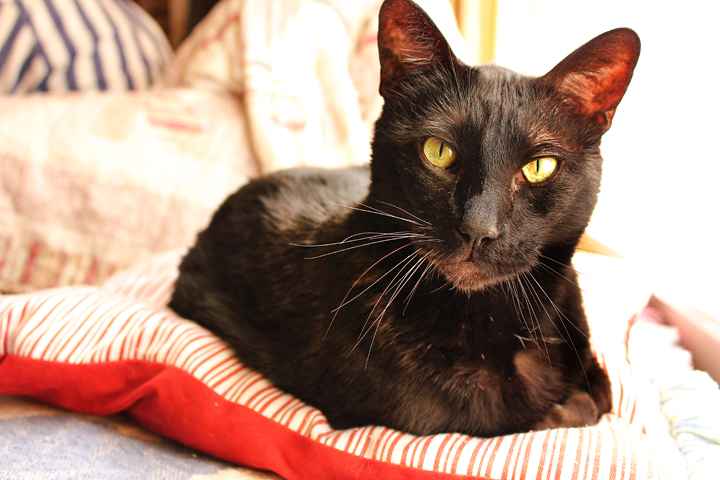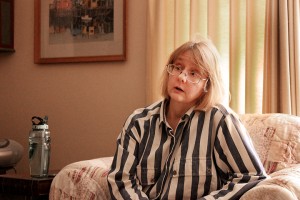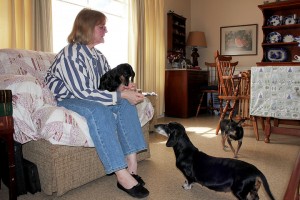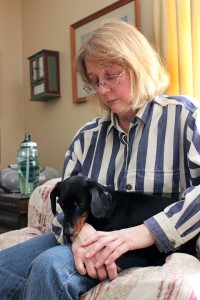Story by Jessica Chia
Photos by Justin Chatham
“I was 8 years old and I wanted to be a horse. I started showing dogs when I was 13 because I couldn’t have a horse in my backyard.”
Donna Hurst, a 47-year-old Waco native, reveals her lifelong love of animals as three small black dogs and a very large black cat contentedly roam her living room.
Hurst and her husband, Randall Stuckey, 54, have lived in Waco for seven years and have spent the past two years volunteering as foster parents for the Humane Society of Central Texas.
“They take very difficult cases,” said Karen Froelich, the executive director for the Humane Society of Central Texas. “One dog, we thought was basically just going to go and die at their home. He was in such bad shape. But they really helped him and he’s still with them now.”
The dog nobody expected to survive was Elvis, a senior chihuahua and schipperke mix, who was rescued during a puppy mill raid in May 2009, the only survivor of four maltreated dogs that warranted felony charges against the owner of the puppy mill.
“He was really an accidental,” Hurst said of her decision to foster Elvis. “I just couldn’t turn him down, you know? They expected three months, maybe five months, there wasn’t a chance of him living. He’s surprised everybody. He’s been with us a year and a half.”
Elvis suffers from congestive heart failure, anxiety attacks, heartworms, the loss of all but three teeth, various bodily scarring and a lack of social skills.
Because of the couple’s dedication, Elvis has shown much improvement both physically and emotionally, but no amount of love and care can completely erase the damage from his many years in the puppy mill.
“He’s learned that not everyone is out to get him,” Hurst said. “But something that didn’t bother him one day may cause him to take off the next. He’s very unpredictable. Most people I don’t think would be willing to take that on.”
Elvis is fed each day at 8:15 a.m. and 6:15 p.m. and requires several medications to be administered regularly, with the occasional addition of Valium, which prevents his sporadic anxiety attacks from becoming fatal.
“The panic attacks kick off this tremendous coughing. With his congestive heart failure it’s awful. It sounds like he has COPD [Chronic Obstructive Pulmonary Disease],” Hurst said.
Far from considering Elvis a burden, Hurst and Stuckey regard the dog with fondness and accept his special needs as part of his individuality.
Hurst said, “With all of his medical problems, he just couldn’t get adopted. Provided you take him on his own terms, he’s a really sweet boy. He was recently offered to us on a permanent foster. He’s a foster, but he’s not going anywhere, and that’s just fine. He’s not going to be a normal dog ever, but the time he has left, he can be safe, happy and loved.”
Their experience with Elvis only left them eager to foster more animals for the Waco Humane Society.
Ollie, an inky black 9-year-old oriental shorthair mix, became a new addition to their household in June 2010 after being surrendered to the humane society by his previous owner.
“The most difficult animals to place in a home are the black cats, black dogs. I guess with black cats it’s, you know, the Friday the 13th bad luck,” Hurst said.
One can’t help but link their concern for disadvantaged animals with the fact that all but two of the dogs and cats in Hurst and Stuckey’s home are black, although Hurst said it was completely unintentional.
It seems that Ollie, however, beat the odds against him.
He was officially adopted by Hurst and Stuckey in mid-February and clearly holds a special place in the couple’s hearts, even though he wasn’t exactly what they had in mind at first.
“He was older than what I was going to bring home,” Hurst said. “We thought we were getting a quiet, laid-back, small cat. Here we get this big, black house panther. He is constantly talking. He talks and talks. When we first brought him here, most cats would just dive under the couch but he was just all over the room.”
Ollie’s confident personality was evident as he lounged on a pillow, alternately gazing into the camera’s lens or dramatically turning away as the photographer snapped photos.
Hurst was not surprised.
“He’s very photogenic. He loves the camera. I have a blog for him called Black Cat Friday. I can always count on getting a good photo of him sometime during the week.”
Hurst and Stuckey’s newest foster, a 10-year-old black and tan miniature dachshund named Snickers, has only been with them since January.
Although he had little hope of being adopted in the neglected condition in which Hurst and Stuckey first received him, Snickers is now ready to be adopted into a loving home.
“You could smell his teeth from about 15 feet away. I have never seen teeth this bad. The vet they have at the shelter examined him and his gums were bleeding. We got rotting teeth and rotting food,” Hurst said of his health when they first met Snickers.
Snickers now has a clean, healthy mouth and a friendly, laid-back attitude to match.
“He’s going to make somebody a really nice pet. He’s ready to be adopted, but he’s a senior, which makes it harder,” Stuckey said.
“He acts like he’s closer to 7 or 8. He’s very active, very playful,” said Hurst.
Stuckey explained that any cat or dog above the age of six is considered a senior, although he is quick to point out that it really depends on the breed of dog how far along in their lifespan they actually are.
Despite the greater difficulty involved with placing senior animals, Hurst and Stuckey prefer to take in only adults.
Although they embrace many factors that make animals less desirable to potential adoptive families or other foster homes, there are some aspects of fostering animals Hurst acknowledges are challenging.
“Not knowing where the animal came from, even when you have an owner surrender. You don’t know what kind of a household they came from, what they’re used to, what they’re not used to.”
Hurst also mentioned that one difficulty in the fostering experience is the emotional attachment to an animal that develops as she prepares the animal to be placed in another home.
“You’ve brought an animal in and you’ve just so fallen in love that you can’t give it up. That’s the biggest challenge. It takes a certain kind of person to do it, because you know it’s temporary. But [if an animal gets adopted] you’ve freed up a spot for another animal at the shelter because you’ve made space.”
Although she recognizes the emotional cost of fostering, Hurst did not consider fostering to be materially difficult since the Humane Society of Central Texas covers all medical expenses for the animals in their foster program.
“Financially it really isn’t [a burden]. You’re pretty much paying for their food,” she said. “Elvis is on a half a dozen medications and the shelter takes care of that. Snickers with his dental last month, the shelter picked that up. Time-wise, and emotionally, the more you work with an animal the more you get emotionally involved with them. The time involved really depends on the animal, but they’re treated just like our own would be. This household has four or five animals steady, so it’s not really a burden.”
For Hurst and Stuckey, animals are an integral part of their lives. Hurst spent her adolescence and young adulthood breeding and showing dachshunds, while Stuckey’s family raised Chihuahuas.
Of fostering, Hurst said, “I don’t really think it’s been all that different. My showing and breeding days are long gone, but I’ve always had a large number of animals. It just takes different forms. There’s just not enough homes to around. It’s really a sad thing. I love animals, so fostering is just one more way I can help out.”




